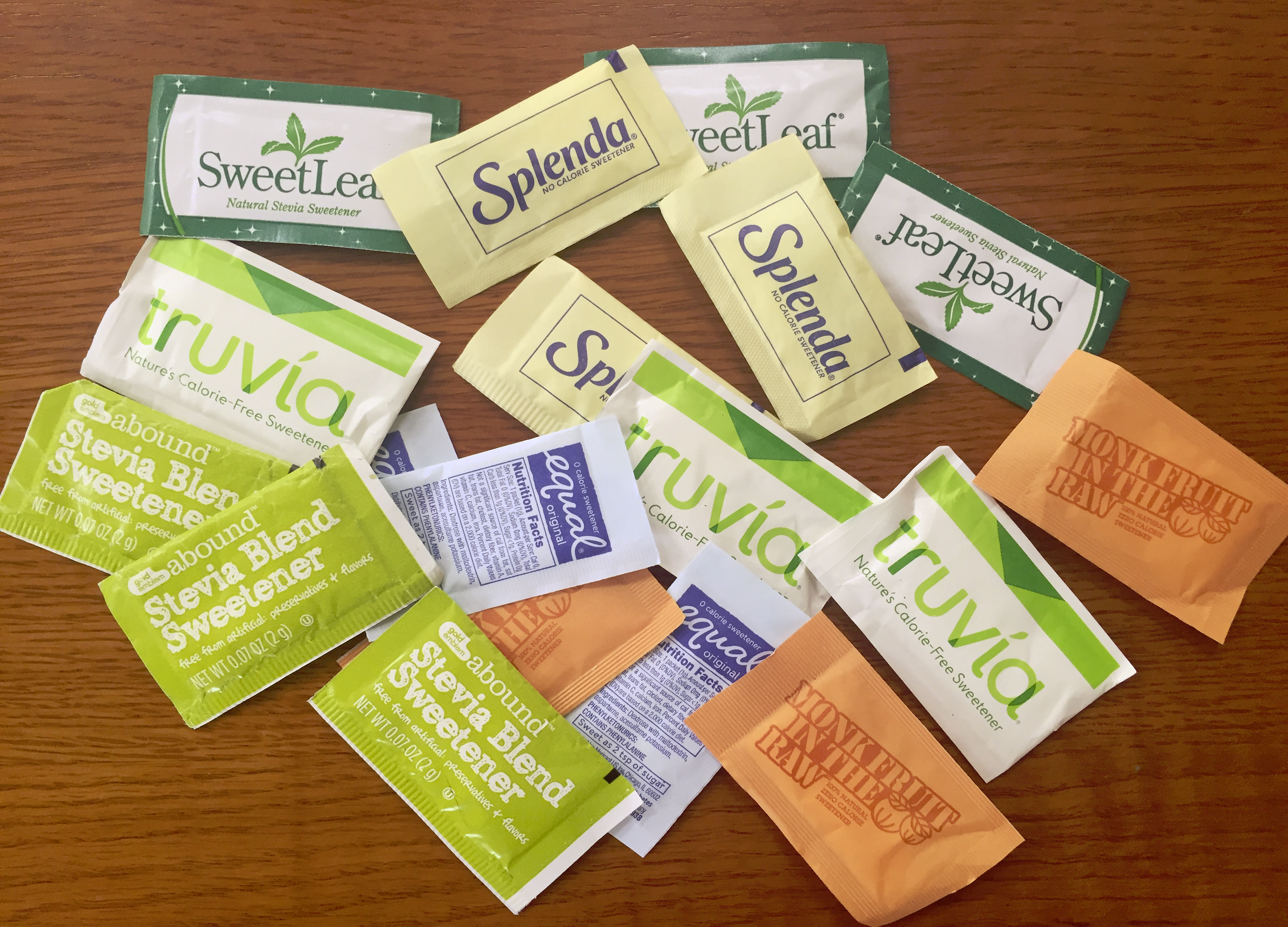
Non-Caloric Sweeteners
The data are not yet conclusive on the long-term impact of non-caloric sweeteners. There is some evidence that non-caloric, sweeteners may still trigger negative responses in the metabolic system. As much I would like to endorse “natural” alternatives, as a scientist I can’t, because the science simply isn’t there yet to make a definitive statement.
Non-caloric sweeteners and sugar alcohols are not considered added sugars by the Food and Drug Administration (FDA), and therefore are not included in our Added Sugar Repository.
Non-Caloric Sweeteners
What are non-caloric sweeteners (NCSs)?
Non-caloric sweeteners, also known as non-nutritive or low-caloric sweeteners, are sweeteners used in food manufacturing that have little to no calories. They are commonly used as sugar substitutes or alternatives, and are many times sweeter than regular sugar.
While the consumption of NCSs may be beneficial for those looking to follow a low calorie diet without sacrificing the sweetness of real, caloric sugar, the full effects of these products are controversial and not yet fully understood. In fact, some studies suggest they may have a negative effect on human health.Pepino (2015), for example, finds that consumption of non-caloric can cause metabolic disorders, such as obesity and type 2 diabetes. Lenoir et al. (2007) concludes the sweetness of non-caloric sweeteners to be more addictive than cocaine.
FDA approved NCSs:
Acesulfame potassium
- Also known as: Acesulfame-K or Ace-K
- Can be found in: Mentos Watermelon Gum
- Branded as: Sunett, Sweet One
Aspartame
- Aspartame is technically considered a nutritive sweetener by the FDA but is used in such small quantities so as not to significantly impact caloric intake
- Can be found in: Coca Cola Zero Calorie Soda
- Branded as: Equal, Sugar Twin 2
Luo Han Guo fruit extracts
- Also known as: Monk Fruit
- Monk fruit extracts are subject to FDA approval for specific uses; they are not universally approved to be use as a sweetener
- Can be found in: Quaker Real Medleys Summer Berry Oatmeal
- Branded as: Monk Fruit In the Raw, Swanson PureLo
Neotame
- Neotame is not required by the FDA to be listed on nutrition facts
- Branded as: NutraSweet Neotame
Saccharin
- Can be found in: Schweppes Diet Tonic Water
- Branded as: Sweet’N Low, Sugar Twin
Steviol glycosides
- Also known as: Stevia
- Certain high purity steviol glycosides have been deemed acceptable by the FDA, but the use of stevia leaf and crude stevia extracts is not considered GRAS (generally recognized as safe) and is not permitted for use as a sweetener. Forms not deemed acceptable by the FDA for use as sweetener can still be found in some health food stores as “dietary supplements” that have not been FDA approved
- Can be found in: Quest Maple Waffle Protein Bar
- Branded as: Truvia, Pure Via, SweetLeaf
Sucralose
- Can be found in: Thomas’ 100% Whole Wheat English Muffin
- Branded as: Splenda

Thomas’ 100% Whole Wheat English Muffin

Splenda No Calorie Sweetener Box of Individual Packets
Sugar Alcohols
What Are Sugar Alcohols?
Sugar alcohols are carbohydrates that have chemical characteristics of both sugar and alcohols. They are found naturally in small amounts in some fruits and vegetables, but are often now commercially produced from sugars and starches for use in “sugar-free” or “reduced sugar” products.
According to the FDA, sugar alcohols do produce a smaller change in blood glucose (blood sugar) than other carbohydrates, but they can also cause abdominal gas bloating, and diarrhea in some individuals because they are not completely absorbed by the body.
FDA approved sugar alcohols:
Erythritol
- Can be found in: No Cow Chunky Peanut Butter Bar
Hydrogenated Starch Hydrolysates
- Also known as: Hydrogenated Glucose Syrup, Sorbitol Syrup, Maltitol Syrup
- Can be found in: Extend Nutrition Yogurt & Berry Anytime Bar
Isomalt
- Can be found in: Tic Tac Freshmint Gum
Lactitol
- Can be found in: Edy’s Triple Chocolate Ice Cream
Maltitol
- Can be found in: Pure Protein Chocolate Peanut Caramel Bar
Mannitol
- Can be found in: Boca All American Veggie Burgers
Sorbitol
- Can be found in: Blue Bunny Salted Caramel Craze
Xylitol
- Can be found in: Bulletproof Dark Chocolate Collagen Protein Cold Brew

Edy’s Triple Chocolate (“No Sugar Added”) Ice Cream
Disclaimer: This blog post is intended for informational purposes only, and it should not serve as a medical resource. Please contact a doctor, a registered dietician, or other qualified healthcare providers with any questions regarding your personal dietary needs.
Sources:
https://www.accessdata.fda.gov/scripts/InteractiveNutritionFactsLabel/factsheets/Sugar_Alcohols.pdf


